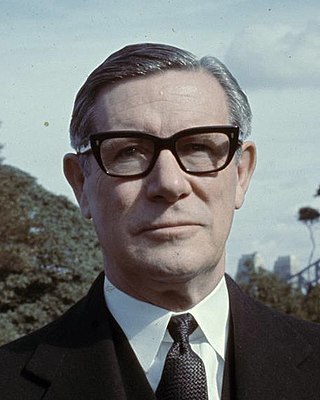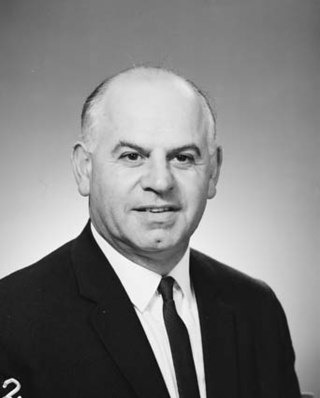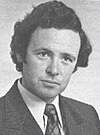
Robert James Lee Hawke was an Australian politician and trade unionist who served as the 23rd prime minister of Australia from 1983 to 1991. He held office as the leader of the Australian Labor Party (ALP), having previously served as the president of the Australian Council of Trade Unions from 1969 to 1980 and president of the Labor Party national executive from 1973 to 1978.

Edward Gough Whitlam was the 21st prime minister of Australia, serving from December 1972 to November 1975. To date the longest-serving federal leader of the Australian Labor Party (ALP), he was notable for being the head of a reformist and socially progressive government that ended with his controversial dismissal by the then-governor-general of Australia, Sir John Kerr, at the climax of the 1975 constitutional crisis. Whitlam remains the only Australian prime minister to have been removed from office by a governor-general.

Paul John Keating is an Australian former politician who served as the 24th prime minister of Australia from 1991 to 1996, holding office as the leader of the Labor Party (ALP). He previously served as treasurer under Prime Minister Bob Hawke from 1983 to 1991 and as the seventh deputy prime minister from 1990 to 1991.

Simon Findlay Crean was an Australian politician and trade unionist. He was the leader of the Australian Labor Party (ALP) and leader of the opposition from 2001 to 2003. He represented the seat of Hotham in the House of Representatives from 1990 to 2013 and was a cabinet minister in the Hawke, Keating, Rudd and Gillard governments.

William George Hayden was an Australian politician who served as the 21st governor-general of Australia from 1989 to 1996. He was Leader of the Labor Party and Leader of the Opposition from 1977 to 1983, and served as Minister for Foreign Affairs and Trade from 1983 to 1988 under Bob Hawke and as Treasurer of Australia in 1975 under Gough Whitlam.

Francis Daniel Crean was an Australian politician who served as a member of the House of Representatives from 1951 to 1977, representing the Labor Party. He was a minister in the Whitlam government, including as Treasurer from 1972 to 1974 and the fifth deputy prime minister for a few months in 1975.

Lance Herbert BarnardAO was an Australian politician and diplomat. He was the deputy leader of the Australian Labor Party (ALP) from 1967 to 1974 and held senior ministerial office in the Whitlam government, most notably as the third deputy prime minister of Australia from 1972 to 1974.

Lionel Frost BowenAC was an Australian politician. He was the deputy leader of the Australian Labor Party (ALP) from 1977 to 1990 and served as the sixth deputy prime minister of Australia in the Hawke government from 1983 to 1990.

Ralph Willis AO is an Australian former politician who served as a Cabinet Minister during the entirety of the Hawke-Keating government from 1983 to 1996, most notably as Treasurer of Australia from 1993 to 1996 and briefly in 1991. He also served as Minister for Industrial Relations, Minister for Transport and Communications and Minister for Finance. He represented the Victorian seat of Gellibrand in the House of Representatives from 1972 to 1998.

John Norman Button was an Australian politician, who served as a senior minister in the Hawke and Keating Labor governments. He was notable for the Button car plan, which involved downsizing and eventually ending Australia's car industry by reducing tariffs and government protection.
Thomas James Burns AO was an Australian politician who led the Labor Party (ALP) in Queensland between 1974 and 1978 and was Deputy Premier of Queensland between 1989 and 1996. He served as the Member for Lytton in the Parliament of Queensland between 1972 and 1996. Burns had previously served as the Federal President of Labor between 1970 and 1973, playing a key role in modernising the party prior to the election of Gough Whitlam as the Prime Minister of Australia in 1972.

Sir Nigel Hubert Bowen, was an Australian lawyer, politician and judge. He was a member of the Liberal Party and served in the House of Representatives from 1964 to 1973, representing the New South Wales seat of Parramatta. He held senior ministerial office in multiple Coalition governments, serving as Attorney-General, Minister for Education and Science (1969–1971), and Minister for Foreign Affairs (1971–1972). After the Coalition lost the 1972 election he was an unsuccessful candidate to replace William McMahon as Liberal leader, losing to Billy Snedden by a single vote. After leaving politics he served as the inaugural chief justice of the Federal Court of Australia (1976–1990).

Samuel Herbert Cohen QC was an Australian politician and barrister. He was a member of the Australian Labor Party (ALP) and served as a Senator for Victoria from 1962 until his death in 1969. He was also a member of Gough Whitlam's shadow ministry from 1967. He was the first Jew elected to the Senate.
Antony Philip Whitlam is an Australian lawyer who has been a politician and judge. He is the son of Gough Whitlam and Margaret Whitlam.

A leadership spill of the Australian Labor Party (ALP), then the opposition party in the Parliament of Australia, was held on 16 July 1982. Shadow Minister for Industrial Relations, Employment and Youth Bob Hawke unsuccessfully challenged ALP leader Bill Hayden, with Hayden winning 42 votes to 37.

A leadership spill in the Australian Labor Party, the party of opposition in the Parliament of Australia, was held on 27 April 1966. It followed a challenge by party deputy-leader Gough Whitlam against incumbent leader Arthur Calwell. Calwell received 49 votes to Whitlam's 25 in a caucus ballot. After claiming victory Calwell then announced that if Labor was defeated at the impending 1966 federal election, he would not stand for the leadership again.

A leadership spill of the Australian Labor Party (ALP), then the opposition party in the Parliament of Australia, was held on 31 May 1977. Former Treasurer Bill Hayden unsuccessfully challenged Labor leader Gough Whitlam. Whitlam was narrowly re-elected by 32 votes to 30 leading him to later refer to many in his caucus as 'out of touch'.

A leadership spill in the Australian Labor Party, the party of opposition in the Parliament of Australia, was held on 27 January 1976, the date of the first Caucus meeting following the 1975 election.
The Shadow Ministry of Gough Whitlam was the opposition Australian Labor Party frontbench of Australia from 8 February 1967 to 5 December 1972, opposing the Liberal-Country Coalition government.
The Shadow Ministry of Bill Hayden was the opposition Australian Labor Party shadow ministry of Australia from 29 December 1977 to 3 February 1983, opposing Malcolm Fraser's Coalition ministry.


















